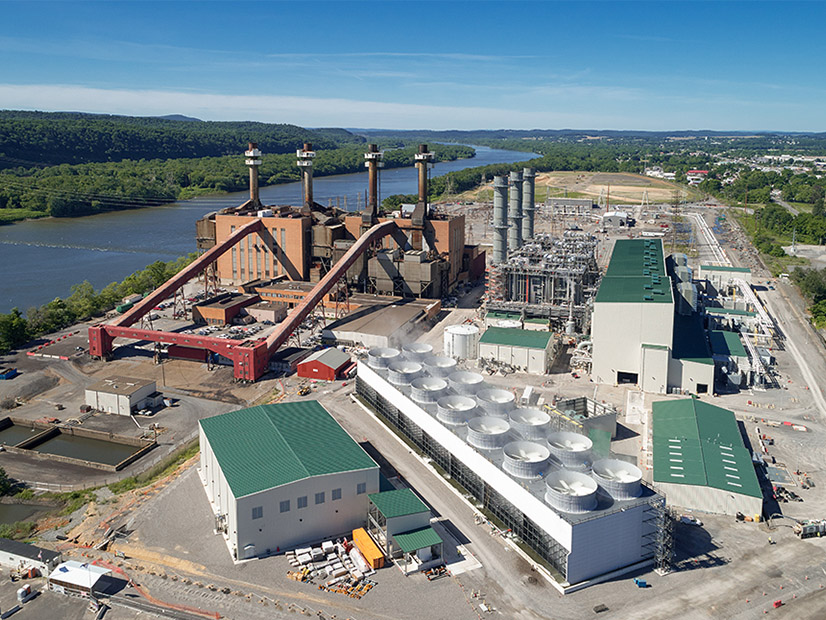
FERC on Thursday rejected Panda Hummel Station’s proposed settlement on its annual revenue requirement for reactive service under the PJM tariff, remanding the proceeding to the chief administrative law judge to resume hearing procedures (ER19-391).
The commission sided with comments by its trial staff who found the proposal for the 1,153-MW natural gas-fired combined cycle generation station in Snyder County, Pa. to be a “settlement in name only.”
“The terms are egregiously one-sided and the ‘settlement’ annual revenue requirement (ARR) is not the result of a negotiated compromise among the participants, but rather is an amount of Panda Hummel’s own choosing,” staff said.
FERC said it has an “independent responsibility” to consider the public interest in reviewing filings and may approve a settlement contested by trial staff, even if staff “raises material issues of fact.”
“The commission recognizes the importance of comments submitted by trial staff, as trial staff represents the public interest in settlement and hearing proceedings, and, when appropriate, has rejected settlements where trial staff was the only participant to object,” FERC said. “Here, we have carefully considered Panda Hummel’s arguments and find that the settlement rate may be excessive, such that we cannot find the settlement to be fair and reasonable and in the public interest. Thus, we find that it is appropriate to resume hearing procedures in this proceeding.”
Panda Hummel Settlement
In November 2018, Panda Hummel proposed a rate schedule that included an annual reactive service revenue requirement of $6.7 million.
After the commission responded by ordering hearing and settlement judge procedures, Panda Hummel filed a proposal offering to reduce its ARR for reactive power to $5.6 million. Panda Hummel said its original filing “based certain costs and inputs on budgets or estimates.” The reduced ARR updated those figures — operations, maintenance, administrative and general costs — with actual expenses, the company said.
I’ve made the change onlineThe proposed settlement also laid out the methodology used to calculate the revenue requirement, stating that major equipment costs included in the revenue requirement were similar to ones approved in 2018 by the commission for the Public Service Enterprise Group Keys Energy Center, a 755-MW combined cycle gas plant in Maryland (ER18-1222).
Panda Hummel argued that FERC approved costs from the PSEG Keys settlement “for a generator that is not materially different from the facility except that it is smaller in size and has lower cumulative costs for its major equipment.”
Settlement Responses
FERC trial staff responded that the settlement was not fair or reasonable because it gives Panda Hummel “the sole right to accept any modifications and effectively gives Panda Hummel the unilateral power to decide when refunds are made.” The staff contended that there was no way to verify the settlement’s annual revenue requirement and that it contained a “fundamental lack of certainty because it is expressly reliant on issues being examined in separate cases.”
Staff also argued that the settlement should be rejected because it “seeks to bypass the commission’s settlement and hearing processes.” They said allowing Panda Hummel to “unilaterally select its own revenue requirement, eschew its burden of proof obligation, avoid an assessment of its rates and scrutiny of its costs, and forego settlement and hearing procedures” was not fair or reasonable.
In its decision, the commission said it found Panda Hummel’s proposed methodology in the settlement to be “flawed” and included inputs that are “inconsistent” with FERC policy.
“We disagree with Panda Hummel that PSEG Keys’ as-filed costs as reflected in the PSEG Keys settlement can be adopted by any plant that shares some similarities with it, without any further inquiry,” the commission said. “In any event, the commission’s approval of the PSEG Keys settlement is non-precedential.”
The IMM made its own comments regarding the Panda Hummel settlement in August 2020, saying it “opposes the unilateral offer of settlement to the extent that the settlement would not be analyzed on its merits, including under the just and reasonable standard.” The IMM also argued that trial staff is the “only participant raising cost of service issues and the settlement should not be approved without addressing these issues.”
The commission said the IMM failed to file an affidavit or supporting evidence regarding its challenges to the revenue requirement and that the primary objection “appears to raise a policy issue regarding whether trial staff’s objection to a settlement should render it contested and subject to the just and reasonable standard.
“This issue, in addition to not being a disputed issue of material fact, is outside the scope of the settlement,” the commission said.
Settlements Approved
The commission approved uncontested settlements regarding reactive supply and voltage control for the Michigan Public Power Agency (ER21-2348) and Story County Wind (ER20-1906-001).
The commission also approved an uncontested settlement reducing the transmission revenue requirement (TRR) for DATC Path 15’s ownership of the Path 15 Upgrade — an 84-mile, 500-kV transmission line along the existing Path 15 corridor in California — from $25.6 million to $20.5 million from June 13, 2020 through June 12, 2022; $18.8 million from June 13, 2022 through June 12, 2023; and $18.5 million from June 13, 2023 through the next rate case (ER20-1006-001). DATC had originally proposed a TRR of $21.7 million.
Also approved was an uncontested settlement reducing Wisconsin Electric Power’s return on common equity from 11% to 9.85%, effective July 1, 2020 (ER21-1965; EL20-57). Cloverland Electric Cooperative had challenged Wisconsin Electric’s 11% ROE as excessive.
Rich Heidorn Jr. contributed to this report.


